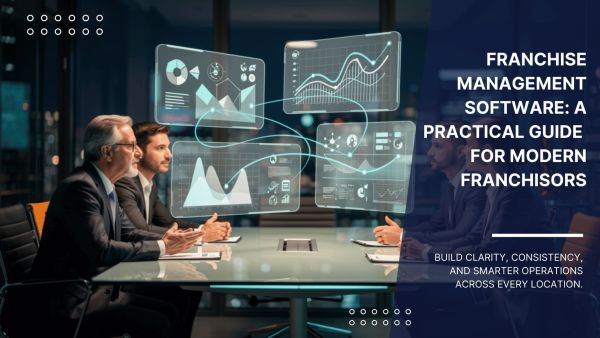The Top 7 Features Every Franchise CRM Software Should Have
by
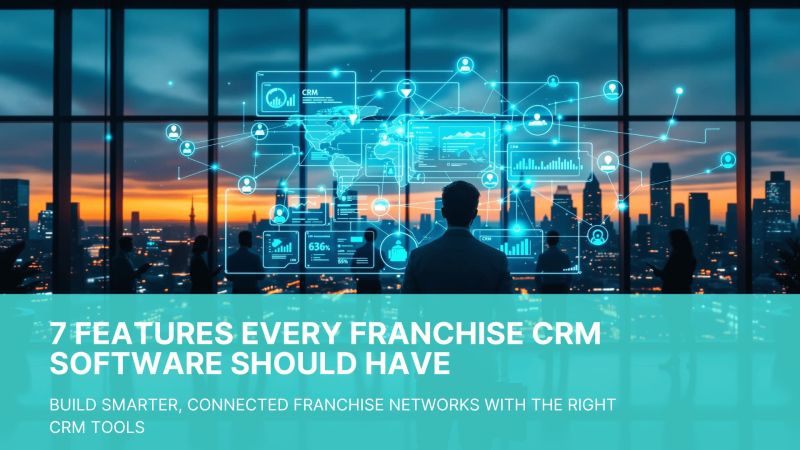
-
What Is Franchise CRM Software?
- 1. Multi-Level Lead Management and Tracking
- 2. Centralized Email Marketing and Automation
- 3. Time-Saving Templates, Workflows, and Automation
- 4. Real-Time Reporting and Shared Dashboards
- 5. Franchise Management Tools Built into the CRM
- 6. Customizable Pipelines for Franchisors and Franchisees
- 7. Quoting, Invoicing, and Payment Integration
- The Real Impact of Using a Franchise CRM
- How to Evaluate Franchise CRM Software
- FAQs
Running a franchise is a balancing act. You’re managing people, locations, and customer expectations while keeping everything consistent and efficient. Some days, it can feel like you’re spinning plates while answering emails and reviewing reports. That’s why having the right customer relationship management (CRM) system isn’t just helpful, it’s essential.
A good franchise CRM acts as the heartbeat of your network. It connects franchisors and franchisees in one space where everyone can share data, track progress, and stay organized. When you have that kind of visibility, you can focus less on chasing updates and more on building a business that runs smoothly at every level.
Let’s take a look at the seven features that make a franchise CRM truly worth your time, and how each one helps you run a stronger, more connected operation.
Quick Comparison on How a Franchise CRM Improves Performance
| Category | Without a CRM | With a Franchise CRM |
|---|---|---|
|
Lead Response Time |
Delayed and inconsistent |
25% faster and automated |
|
Communication |
Scattered emails and spreadsheets |
Centralized, shared visibility |
|
Onboarding |
Manual and repetitive |
Automated and trackable |
|
Reporting |
Data silos, slow insights |
Real-time dashboards |
|
Admin Workload |
High manual effort |
15–25% time savings weekly |
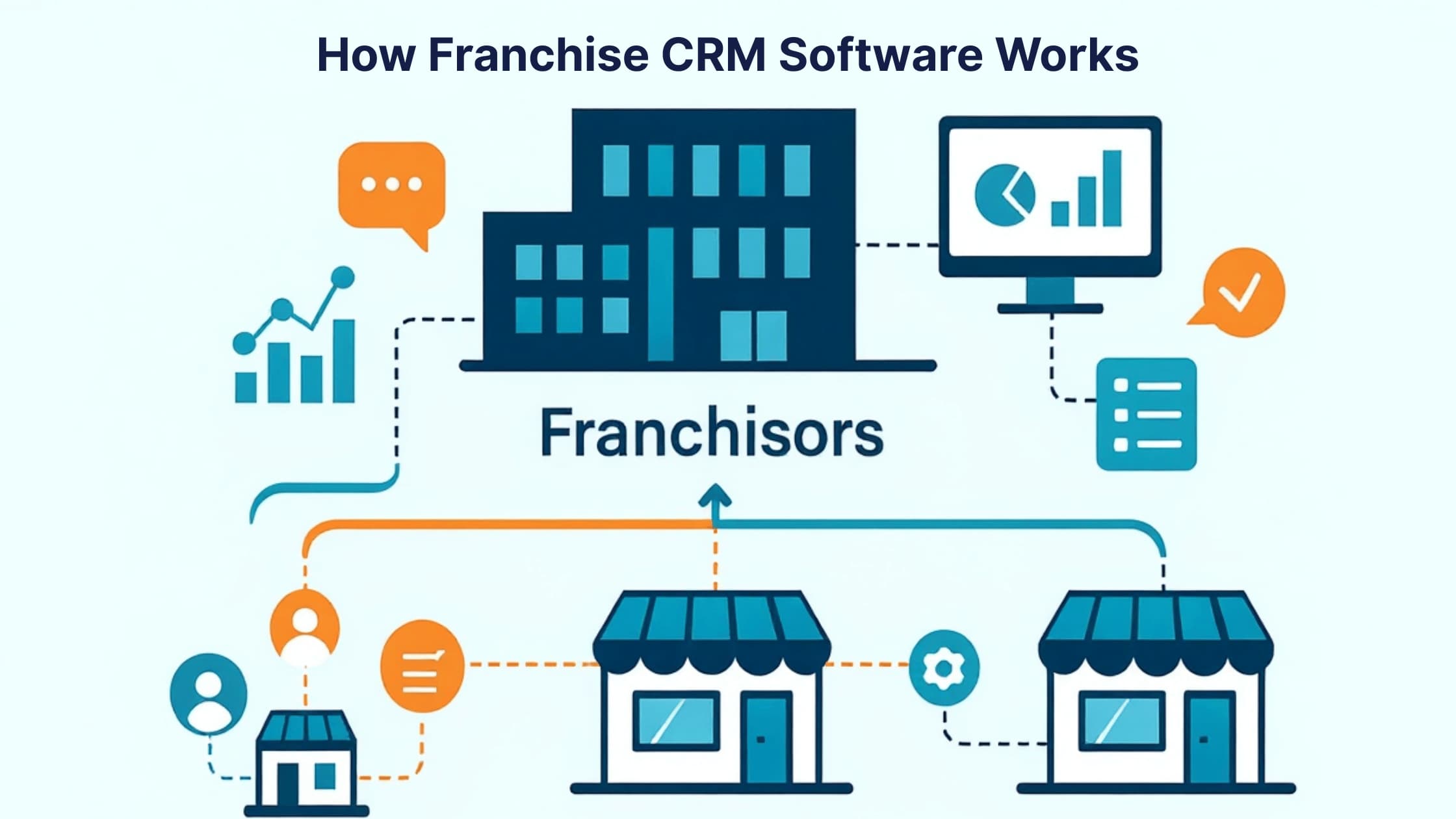
What Is Franchise CRM Software?
Franchise CRM software is built for the way franchises actually work. It gives both franchisors and franchisees the tools to manage sales, marketing, and operations without stepping on each other’s toes.
- Franchisors get oversight and reporting tools that help them see how every location is performing. They can also manage their own franchise sales process in their CRM.
- Franchisees have the autonomy to manage leads and customers in ways that fit their business.
Franchises sit in a unique space. They are part corporate, part local business. That means your success depends on clear communication and consistent systems. Without a shared CRM, data gets stuck in spreadsheets or buried in emails, and important opportunities get lost.
A good CRM bridges that gap. It gives franchisors visibility while helping franchisees focus on customer relationships. According to Pulse data, franchises using centralized CRMs respond to leads 25% faster and retain customers longer because nothing falls through the cracks.
One fitness brand learned this firsthand. Before switching to Pulse, every location handled renewals differently. One used a spreadsheet, another used sticky notes. Once they set up automated renewal workflows, every member got timely reminders, and renewals jumped 28% in just three months. It wasn’t about fancy tech. It was about making things simpler for everyone involved.
When your CRM connects people and data, you build consistency, trust, and growth across your entire network.
Franchise CRM Benefits by Role
| Role | Key CRM Benefit | Example in Practice |
|---|---|---|
|
Franchisor |
Oversight and visibility across all locations |
Track KPIs, view lead activity, and coach franchisees effectively |
|
Franchisee |
Streamlined sales and marketing operations |
Use shared templates to automate follow-ups and local campaigns |
|
Operations Manager |
Simplified onboarding and compliance |
Monitor onboarding progress and document completion from one pipeline |
|
Marketing Team |
Unified campaign performance |
Measure engagement across all locations and optimize strategy |
1. Multi-Level Lead Management and Tracking
If you’ve ever lost a lead because of a missed email or unclear handoff, you know how costly it can be. Franchises handle lead management from two angles. The franchisor typically oversees lead generation for the entire network and uses the CRM to automatically distribute those leads to the right franchise location based on geography or service area. Meanwhile, franchisees manage those leads locally, turning inquiries into loyal customers. A strong CRM keeps both sides working together seamlessly.
A great system should let you:
- Create separate yet connected pipelines for both franchisor and franchisee leads.
- Track progress in real time and see where each opportunity stands.
- Spot bottlenecks and fix them before they become lost sales.
When franchisors can see how locations are performing, they can step in to help rather than micromanage. And franchisees can focus on selling, confident that their efforts are visible and supported. This kind of alignment keeps everyone moving in the same direction.
2. Centralized Email Marketing and Automation
Email marketing automation is still one of the most effective ways to connect with both new and existing customers. But for franchises, the challenge is keeping every message on-brand while letting local teams add their own flavor.
Here’s where the right CRM makes a difference. Franchisors can set up branded templates and nurture campaigns, while franchisees can personalize them with local updates. It’s the perfect balance, brand consistency with a personal touch.
Your CRM should let you:
- Share campaigns across locations.
- Automate lead-nurture sequences.
- Track performance to see what’s working.
For example, one gym franchise saw a major jump in engagement when local managers started adding class schedules and trainer updates to their newsletter. The tone stayed consistent, but customers felt a stronger connection. When communication feels personal, people pay attention.
3. Time-Saving Templates, Workflows, and Automation
If your team repeats the same tasks every week, there’s a better way. Franchises run best when systems handle the busywork so franchise teams can focus on growth. That’s where automation comes in.
A strong CRM should include:
- Ready-to-use templates for common emails and tasks.
- Workflows that trigger automatically when deals move through stages or when new leads come in
- Shared automation libraries that franchisors can roll out network-wide.
Let’s say a new customer fills out a lead capture form. The CRM automatically assigns them to the right location, sends a welcome email, and alerts the right team member. You don’t have to lift a finger, and the lead gets a fast, consistent response.
Franchises using automation see a boost in productivity and far fewer missed follow-ups. Automation doesn’t replace people; it gives them more time to focus on what really matters: relationships, service, and growth.
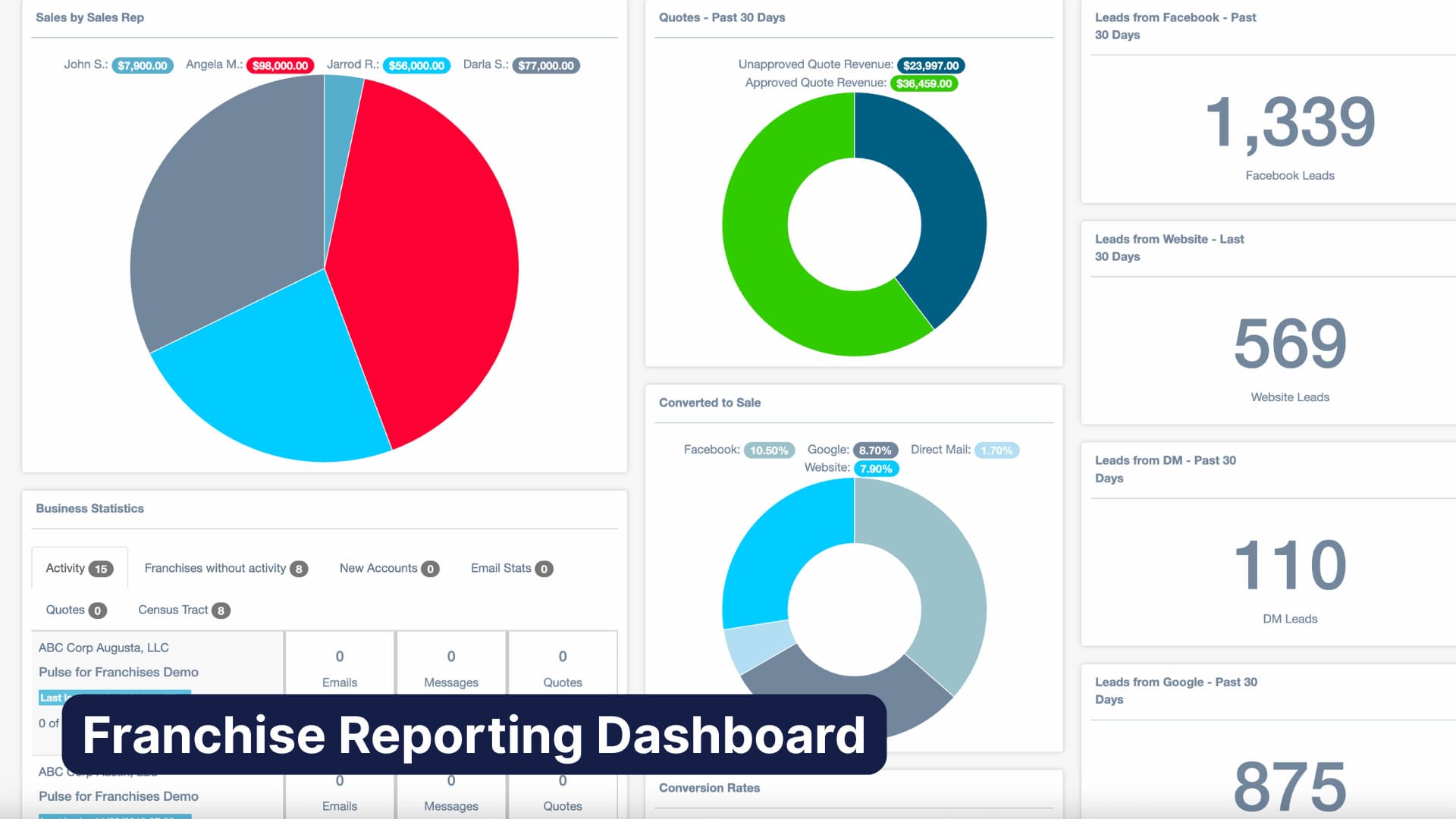
4. Real-Time Reporting and Shared Dashboards
You can’t manage what you can’t see. Reporting is where data turns into action. A reporting dashboard makes it easy for both franchisors and franchisees to understand what’s working and what’s not.
With the right tools, you can:
- Create reports that show exactly what matters to your business.
- Track key performance metrics across every location.
- See updates live rather than wait for month-end summaries.
Imagine logging in and instantly seeing which locations are bringing in the most leads or which campaigns are lagging. That insight helps you coach franchise teams faster, share what’s working, and fix issues before they grow. Franchises that review reports weekly tend to make decisions faster and achieve more consistent performance.
Good data builds trust. When franchisees can see their numbers clearly, they feel supported, not managed. And when franchisors have real visibility, they can lead with facts instead of assumptions.
Let Us Help You Get Started!
Pulse CRM delivers more than software. We’re your partner in success.
We fully set up your CRM, including importing your data, configuring sales and marketing automations, designing branded email templates, writing engaging email copy, setting up sales pipelines, and much more.
5. Franchise Management Tools Built into the CRM
Running a franchise isn’t just about keeping customers happy. It’s about keeping your franchisees confident, informed, and set up for success. A franchise management CRM gives you one place to share training materials, manage compliance, and make onboarding painless.
Your CRM should make it easy to:
- Store and share key documents like manuals, contracts, and policies.
- Automate onboarding workflows so new owners can follow clear steps.
- Manage renewals and compliance without endless reminder emails.
Here’s what that looks like in practice. Instead of sending endless attachments or manual reminders, you can set up automated onboarding processes in your CRM. For example, when a new franchisee joins, automation can trigger a welcome email, send required documents, and schedule follow-up reminders for training steps. You can even create alerts for yourself or your team when key milestones are reached. This way, everyone stays on track without constant back-and-forth.
Franchises that automate onboarding tasks often save up to 15 hours a week in admin time. That’s time you can reinvest in mentoring franchisees, improving processes, or focusing on strategic growth rather than chasing paperwork.
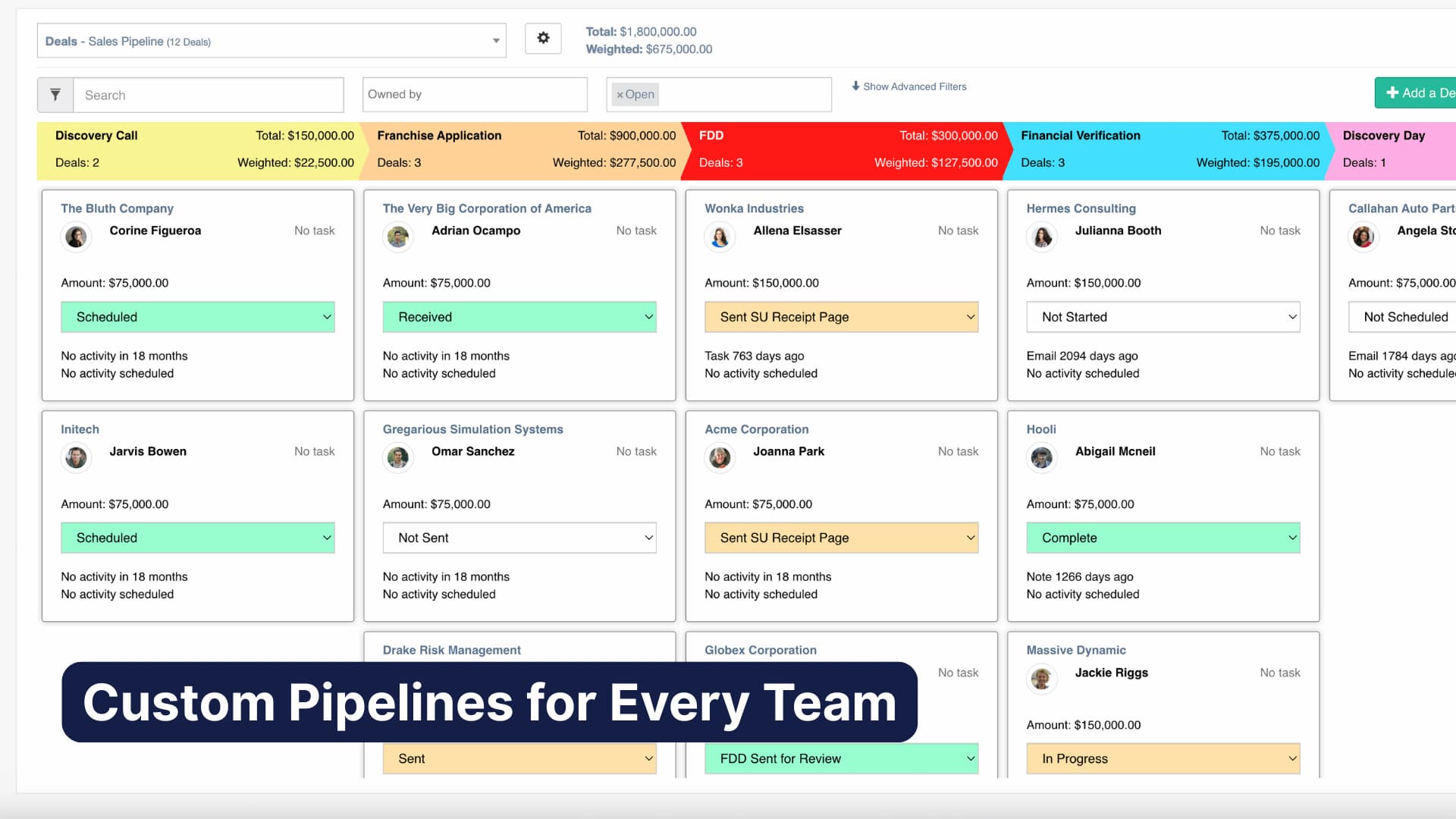
6. Customizable Pipelines for Franchisors and Franchisees
No two franchises work exactly alike, and that’s okay. The right CRM should fit your process, not force you to change it.
A strong CRM pipeline system lets you:
- Map out your unique sales and customer processes.
- Automate next steps and follow-ups.
- Keep everyone aligned without adding extra meetings.
Here’s where this really helps. Franchisors can see how leads and applications are progressing at a glance. Franchisees can focus on their daily work without guessing what’s next. At Pulse, we recommend creating separate pipelines to keep things organized and efficient.
One pipeline helps franchisors manage their sales process for new franchise opportunities, while another helps franchisees handle their own leads and customers. Each franchisee sees only their own contacts and deals, while the franchisor has visibility across the entire network. With filters and reports, they can quickly see how each location is performing.
You can even build multiple pipelines for your franchisees based on the types of services they offer. It’s flexible, practical, and surprisingly easy to set up.
When your CRM matches how your business actually runs, it becomes a tool people want to use. It’s not just another task on the list.
7. Quoting, Invoicing, and Payment Integration
Let’s be honest, billing can be a headache. Between quotes, invoices, and payments, things can get messy fast, especially across multiple locations. That’s why having these tools built right into your CRM changes everything.
Your CRM should let you:
- Build branded quotes and invoices quickly.
- Track approvals and payments in real time.
- Integrate smoothly with your existing accounting tools.
Here’s how it plays out. A customer asks for a quote, and your CRM generates a professional proposal within minutes. Once it’s approved, an invoice is automatically sent with a secure payment link. When the payment hits, the CRM syncs it all to your accounting software, no spreadsheets, no chasing emails.
Franchises that automate billing save around 25% of their weekly admin time. That’s not just hours saved, it’s fewer headaches. It also means every customer gets a consistent, professional experience, and you have a clear picture of cash flow across every location.
When your quoting and payment process runs smoothly, everyone wins: your team, your customers, and your bottom line.
Let Us Help You Get Started!
Pulse CRM delivers more than software. We’re your partner in success.
We fully set up your CRM, including importing your data, configuring sales and marketing automations, designing branded email templates, writing engaging email copy, setting up sales pipelines, and much more.
The Real Impact of Using a Franchise CRM
Here’s a quick look at how a well-implemented franchise CRM changes the way your business operates, from the daily tasks to the bigger picture outcomes.
| Aspect | Before CRM | After CRM |
|---|---|---|
|
Lead Management |
Disorganized tracking and missed follow-ups |
Automated workflows and connected pipelines |
|
Communication |
Inconsistent updates between teams |
Real-time collaboration and shared dashboards |
|
Onboarding |
Manual and time-consuming |
Streamlined, automated, and trackable |
|
Reporting |
Delayed insights and fragmented data |
Real-time visibility and faster decisions |
|
Customer Experience |
Uneven service quality |
Consistent, professional, and reliable interactions |
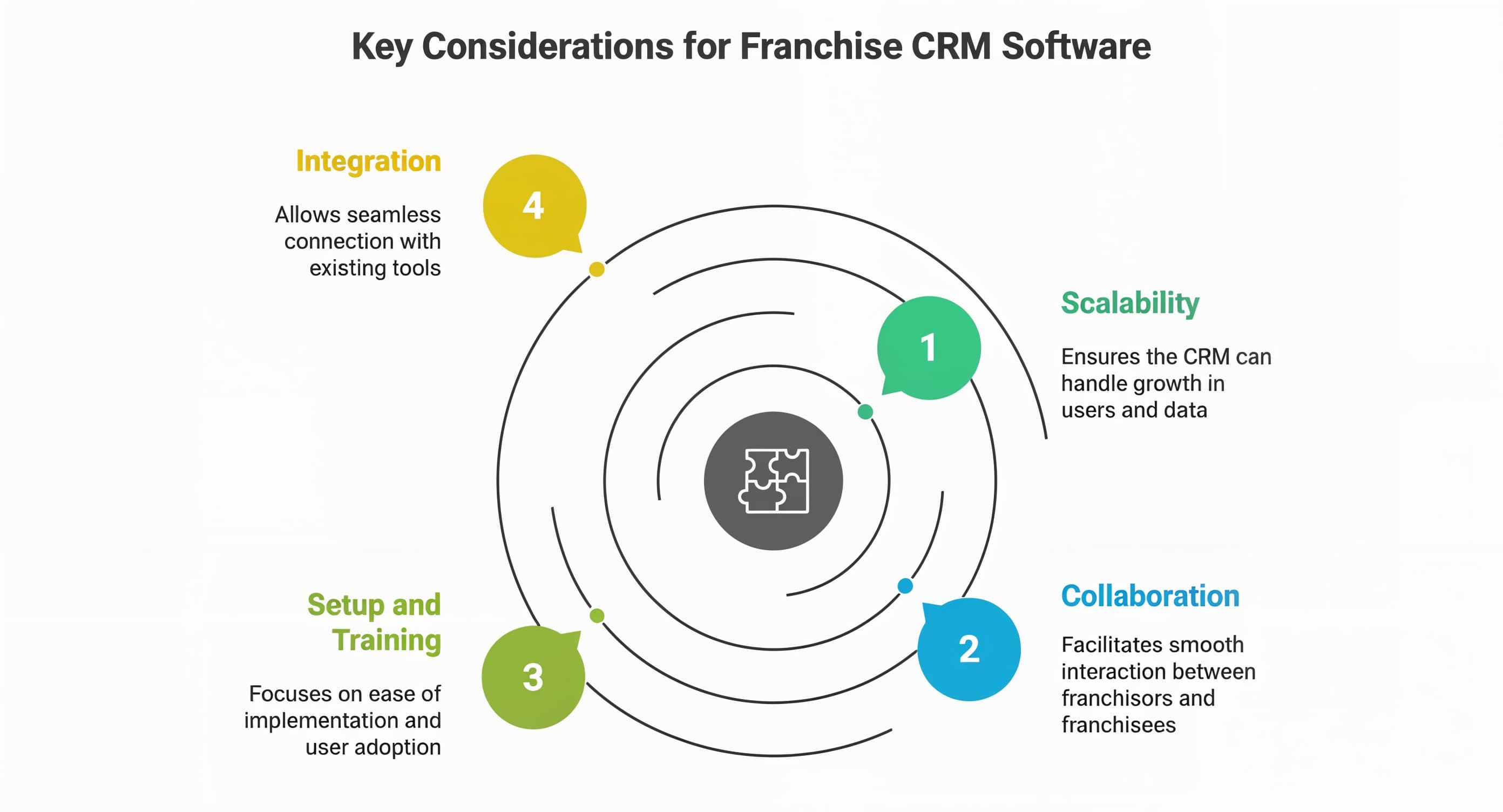
How to Evaluate Franchise CRM Software
Now that you have a good sense of which features matter, let’s pause for a moment and look at the bigger picture. The right CRM isn’t just about bells and whistles. It’s about how well it fits the rhythm of your franchise’s day-to-day life.
Every franchise network has its quirks, its workflow, and its culture. The best CRM should feel like it was designed for your team, not just adapted to them.
- Does the CRM scale easily? Your business is going to grow. Maybe not overnight, but steadily. You’ll add more locations, more users, and more data. A CRM that can scale with you ensures your team doesn’t slow down as your network expands. Look for one that stays simple even when you’re managing dozens or hundreds of users.
- Can franchisors and franchisees collaborate without friction? This is where things can get tricky. You need systems that balance visibility with independence. Franchisors should be able to see performance across every location without making franchisees feel micromanaged. Franchisees, in turn, should have tools that make their work easier, not more complicated.
- Is setup and training manageable? Let’s be real. Even the best CRM is useless if your team doesn’t want to use it. Choose one that’s intuitive, with easy onboarding and clear support materials. From what we’ve seen, teams that dedicate just one week to setup and workflow training often see adoption rates rise by more than 40% within the first month.
- Does it integrate with your current tools? A CRM shouldn’t live on an island. It should integrate smoothly with the systems you already depend on, such as marketing automation, accounting, and communication platforms. Integrations with tools like marketing automation, invoicing, or reporting can keep your entire tech stack running like one system.
Here’s where many franchises either set themselves up for success or trip over the details. A CRM that looks great in a demo might fall apart in the real world if it doesn’t fit your actual workflow. So take your time. Ask yourself: Does this make my team’s day simpler? Does it help us collaborate and scale without adding extra steps?
If you’d like to see how Pulse could fit into your franchise network and make day-to-day operations easier, book a live demo today. Schedule your demo here.
FAQs
Consistency is key in any franchise network. Shared email templates and automation workflows make it easier to keep the tone and branding aligned while still allowing local managers to add details that feel personal to their customers. For example, a franchise fitness brand might send the same monthly newsletter to all locations, but each location can send emails with its class schedules or local events. This approach keeps your message unified while allowing every franchise to feel local and authentic.
Quick responses build trust. Automating lead assignments and follow-ups ensures no inquiries slip through the cracks. Franchises that automate these steps often see faster response times. For instance, when a lead fills out a contact form, the CRM can instantly route it to the correct location and send a friendly acknowledgment message from the assigned franchise. The faster your team follows up, the more likely you are to convert that lead into a customer.
Accountability doesn’t have to mean constant oversight. With shared dashboards, franchisors and franchisees can both see progress, performance, and results in real time. This transparency naturally encourages responsibility without making anyone feel controlled. Visibility replaces micromanagement, and everyone benefits from clear expectations.
Adoption usually struggles when systems feel too complex or overwhelming. New franchisees already have a lot on their plate, so the CRM should make their work easier, not harder. Choosing a CRM that’s intuitive, with clear onboarding and role-specific guidance, helps build confidence fast.
Pulse CRM users often start by automating a single small task, such as sending a welcome email, to get comfortable before exploring more advanced tools. Gradual learning creates stronger engagement and long-term success.

